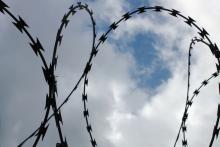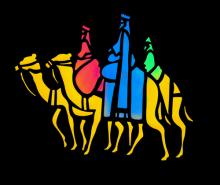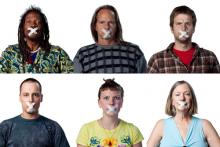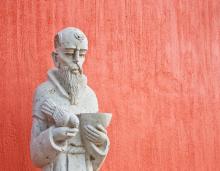Ethics
ETHICS ASKS the questions: What is right to do? How do we know? David P. Gushee puts the concept of the sacredness of human life at the center of his moral reasoning. A professor of Christian ethics at Mercer University in Atlanta, Gushee has given us a work that is an important milestone on the road of constructive Christian ethics.
In this book Gushee has set himself a large and ambitious goal. He writes, “I am proposing that, rightly understood, a moral norm called the sacredness of life should be central to the moral vision and practice of followers of Christ.”
He seeks to ground this moral norm in scriptural authority and in the Christian tradition at its best. His survey of scripture and of Christian history is truly impressive, considering most of the major elements of the Christian theological and ethical traditions, including the current thinking of liberation theology. He demonstrates knowledge of the feminist critique of scripture, and he at least mentions eco-feminism. The bibliography alone is worth the price of the book.
Moreover, Gushee also considers such important Enlightenment thinkers as John Locke and Immanuel Kant. He devotes a chapter each to German philosopher Friedrich Nietzsche and to the Nazi desecration of human life. There is much food for thought here.
For me, however, the book is primarily descriptive. And it does not provide an explanatory framework to help us understand why scripture and the Christian tradition have led the way in both the recognition of the sacredness of human life and in the violation of this holiness. It would have been helpful for Gushee to give us a brief discussion of Ernst Troeltsch, who in his two-volume The Social Teachings of the Christian Churches enables us to see that the line of demarcation between the church and the world is porous to the point that there is always interpenetration between the two. Church teachings leaven and flavor the moral thinking of the world outside its doors while the world’s often destructive ideologies come to church every Sunday and sit down on the front pew and sometimes preach from the pulpit.
ON THE AFTERNOON of Dec. 14, President Obama stood in the White House press room, tears in his eyes, and spoke for many Americans who had watched the terrifying events unfolding in Newtown, Conn.
“I know there’s not a parent in America who doesn’t feel the same overwhelming grief that I do. The majority of those who died today were children: beautiful little kids between the ages of 5 and 10 years old,” he said. “They had their entire lives ahead of them—birthdays, graduations, weddings, kids of their own.”
A little more than a month later, on Jan. 23, a pilotless aircraft owned and operated by the United States and controlled remotely by an individual on U.S. soil launched a targeted attack on the riders of two motorcycles in Yemen. The attack missed its target. It hit the house of Abdu Mohammed al-Jarrah instead, killing several people—including al-Jarrah’s two children.
There was no press conference for the al-Jarrah children.
It was President Obama himself, in fact, after his inauguration in 2009, who authorized an expansion of the U.S. drone program launched under George W. Bush. The “Authorization for Use of Military Force,” passed shortly after Sept. 11, gives the president broad authority to use force against those involved in the 9/11 attacks or those who harbor them. Drones have become President Obama’s weapon of choice.

DURING CONGRESS’ current debate about immigration reform, the realities faced by immigrants and border communities are all too often misunderstood and misrepresented. What are the facts about border issues?
Myth #1: Border walls are effective for keeping out unauthorized border crossers.
Reality: History teaches us that walls don’t work when economic opportunity is on the other side—but walls that are higher and longer do cause more injuries and death when people are forced to go over, under, and around.
The most recent era of migration across the southern U.S. border was caused primarily by economic factors, as the North American Free Trade Agreement (NAFTA) caused millions of Mexican farmers to lose their livelihoods. The current border strategy, enacted hand in hand with NAFTA, envisioned deterring economic refugees by intentionally funneling migration to dangerous desert areas. The danger and death happened; the deterrence didn’t. It was the U.S. economic downturn, much more than the wall, that has caused the current net-zero immigration rate.
Books
Faith meets science
- Scientist Katharine Hayhoe and her spouse, evangelical pastor and writer Andrew Farley, gently and wisely respond to the concerns of those who deny the reality of climate change in A Climate for Change: Global Warming Facts for Faith-Based Decisions (FaithWords). An accessible exploration of the science behind climate change and the faith-based reasons why Christians can and must act.
- Ben Lowe, of Young Evangelicals for Climate Action, describes the rise of climate leadership on Christian college campuses in Green Revolution: Coming Together to Care for Creation (IVP Books).
- In Global Warming and the Risen LORD: Christian Discipleship and Climate Change (Evangelical Environmental Network), Jim Ball offers biblical and spiritual resources needed to meet the challenge.
- No Oil in the Lamp: Fuel, Faith and the Energy Crisis (DLT Books), by Andy Mellen and Neil Hollow, is part science manual, part Bible study and points toward a Christian theology for resource depletion and "peak oil." The unexpected foreword by the CEO of a top U.K. energy company adds depth.
- God, Creation, and Climate Change: A Catholic Response to the Environmental Crisis (Orbis Books), edited by Richard W. Miller, collects original essays by leading Catholic theologians and ethicists to give theological and biblical perspectives on our environmental crisis.
- Green Discipleship: Catholic Theological Ethics and the Environment (Anselm Academic), edited by Tobias Winright, is a compendium drawing on scholars from the fields of ecology, biology, history, and sociology, and includes study group aids. It also has the text of "If You Want to Cultivate Peace, Protect Creation," a January 2010 speech by Pope Benedict XVI, which can also be found at www.vatican.va.
- Sacred Acts: How Churches are Working to Protect Earth's Climate (New Society), by Mallory McDuff, looks at local churches' best practices to reverse climate change.

"NO ONE SPEAKING by the Spirit of God ever says, 'Let Jesus be cursed!'" insists Paul in his first letter to Corinth (12:3). Driving through Corinth not long ago, I found myself musing about the extraordinary spirituality that had grown up in the church he was trying to straighten out. Apparently, ecstatic worshippers caught up in charismatic excitement on the Lord's day were actually known to blurt out these shocking words: "Anathema, Jesus!" In a very brief period, the church there had come up with a mutation of the gospel in which only the cosmic, exalted savior, known through speaking in tongues and exciting miracles, mattered. The earthly person of Jesus of Nazareth had been a mere husk to be shucked off, they said. Only the Spirit-giving celestial Lord mattered. Jesus be damned! His teachings back in Galilee signified nothing; now they could concentrate on the prophecies that came hot and strong from heaven through the church's prophets—a belief that left plenty of room for all sorts of wild ethical "experiments," to put it mildly.
Well, no one actually utters "Let Jesus be cursed" out loud anymore, but, in a more subtle way, how prevalent is a pseudo-spirituality that relativizes the radical teaching of the reign of God! These readings bring us back under the authority of Jesus' witness in Galilee—and the reality that there is no Spirit, and no spirituality, except the one we receive as the driving energy to bring good news to the poor.
OURS IS AN age of interaction, mobility, and change. Unlike most of our grandparents, many of us have moved several times in our lifetimes and have seen our neighbors move in and out. We are more intensely aware, even in our own neighborhoods, that our kind of faith is not the only kind. We see how others have been shaped by very different histories than our own. It becomes clear to us that we, too, have been shaped—and continue to be shaped—by our own history.
Fuller Theological Seminary, where I teach, is in California. Every now and then we feel the ground shifting. The chandelier in our dining room swings or the bed on which we are lying begins to rock. The whole world may not be experiencing little earthquakes as we are, but people are surely experiencing change and variety in faiths and ideologies. This change and diversity can rock a person’s faith. We ask, How do we validate the truth of what we perceive and what we believe? In our time of pluralistic encounter with multiple ideologies and religions and with rapid social, economic, and political change, people search for what Dietrich Bonhoeffer called solid ground to stand on.
Philip Clayton teaches at Claremont Theological Seminary in California. He attended the mainline Presbyterian church that had been his church home since elementary school, plus an evangelical Bible study group, a charismatic prayer meeting once a week in a Pentecostal church, the Assemblies of God church, and a community of “Jesus People.” He writes:
Most of us know friends, colleagues, or acquaintances who are Christian, Jewish, Muslim; Buddhist, Hindu, Taoist; atheist, agnostic, “doubting believers”; pantheist, panentheist, neo-pagan; Mormon, Jehovah’s Witness, Church of God; Baha’i, Zoroastrian, perennialist—the list goes on and on. Faced with such a confusing array of options, more and more Americans are choosing not to choose ... You have to admit, pretty much everything these days is up for grabs. We are in the midst of the most rapid social and technological change that our species has ever undergone.
IN SPRING 1986, a group of Italian activists led by Carlo Petrini launched a protest against the opening of a McDonald’s near the famous Spanish Steps in Rome. This protest marked the origin of the Slow Food movement, which has spread over the last 26 years to more than 150 countries.
Following this Slow Food effort came a host of other Slow movements—Slow Cities, Slow Parenting, Slow Money, and more—that collectively raise opposition to the speed and industrialization of Western culture. Slow movements are beginning to recover what we have lost in our relentless pursuit of efficiency. Many Christians have been challenged by these Slow movements to consider the ways in which our faith has begun to move too fast as we make sacrifices to the gods of efficiency.
This quest has sparked a renewed interest in the joys of sharing life together in local congregations and has intensified into a growing conversation—rather than a movement—called Slow Church. Slowness itself is not a cardinal virtue of Slow Church, but rather a means of resisting the present-day powers of speed in order to be faithful church communities.
The biblical vision of God’s mission in the world is God’s reconciliation of all creation (see, for example, Colossians 1:15-23 and Isaiah 65:17-25). But too often we narrow the scope of our faith and ignore the massive damage that incurs. Some Christians reduce the faith to four easy steps to stay out of hell, others to a set of techniques for growing a large church, and still others to a political ideology (of the Right or the Left). Christianity has also been reduced by some to a feel-good spirituality that has little or no bearing on the rest of our lives or in the public square.

Of all the ugliness in Election 2012, nothing is more disturbing than attempts to prevent people from voting. Voter suppression strikes at the very heart of American democracy.
The flood of money into this year's campaigns has been bad enough, as wealth has sought to do what wealth usually seeks to do: gain control and preference.
The shouting of lies – not just shading the truth, but outright lies – has cheapened the liars and insulted the public.
Demagogic attacks grounded in religion, phony patriotism and race have undermined public trust in all politicians. It will take years to dig out from under the rot of such scorched-earth tactics.
But denying the basic right of citizenship to millions of voters is an offense we should all be protesting. For if the powerful can deny the vote to their opponents – especially the poor and people of color – they can deny the vote to anyone.

Today is the Feast Day of St. Francis of Assisi.
You likely have heard of him. Il Poverello. He's the 13th-century aescetic who founded a religious order.
It was, on one hand, a protest order...protesting how the Church had lost its way in relationship to money and helping the poor. It was on the other hand an opportunity for people to come together and do someting rather remarkable in caring for the poor by joining in solidarity with the poor.
The Friars Minor were formed in 1226. St. Clare of Assisi was co-founder. She has her own feast day, of course, but don't lose this opportunity to get to know her as well.
(There was also an incredibly trippy movie made about his life titled Brother Son, Sister Moon. Some day, when no one is watching, you should rent that film. Outrageously strange.)
Francis' prayer is well known, but today I want to offer up this quotation which is similar, but presents a different focus. Less a prayer and more a philosophical edict, these words moved me this morning:
“Where there is charity and wisdom, there is neither fear nor ignorance. Where there is patience and humility, there is neither anger nor vexation. Where there is poverty and joy, there is neither greed nor avarice. Where there is peace and meditation, there is neither anxiety nor doubt.”

What if music were ethics?
You know, the art of listening and producing sounds as ethics?
I'm just thinking on the old blog here. I'm preaching next Sunday and I'm thinking about listening and music and how we learn to be good to one another. Somewhere someone wrote "It is better to give than receive."
Sister Simone Campbell, executive director of NETWERK, a Catholic social justice group, shares her perspective on the financial challenges facing the nation — and the conversation we should be having.

Hey, is this good news, or what?
Give up organic heirloom tomatoes at $4.99/pound!
Stop paying $5.99 up for a gallon of organic milk!
Buy cheaper ground beef than the organic grass-fed stuff at $7.99+/pound!
Slow down, folks. Read the articles, not just the attention-grabbing headlines. What the scientists discovered was basically this: Take two identical, ripe, juicy, fresh peaches, one of which was grown organically and one of which was not. Analyze the nutritional profile of each. You will find that one peach has just about the same vitamins as the other.
OK, and I'll bet they're pretty much the same color, too. And they probably weigh the same. And if dropped from a tall building, they most likely will go splat at about the same time.
Banks make loans they know homebuyers can’t pay back. Conglomerates market unhealthy food to children. Wall Street tycoons bet against their own shareholders.
In an age when the phrase “business ethics” can seem like an oxymoron, a group of rabbis has designed a course to use age-old Jewish teachings to help infuse some morality into economics -- from the household budget to the stock market.
Run by the Rohr Jewish Learning Institute, which is affiliated with the Chabad-Lubavitch movement of Orthodox Jewry, “Money Matters” is offered at more than 350 locations in 22 countries this year, and is proving to be one of the most popular courses JLI has ever offered, said Rabbi Efraim Mintz, JLI’s executive director.
“When students first come to the course, they may respect the Torah (the Hebrew Bible) and the Talmud (a 2,000 year-old compendium of Jewish oral law and biblical commentary), but few see it as something relevant to the here and now,” Mintz said.
“But soon, they are mesmerized and surprised by its applicability to the business issues of the day.”
More than 22,300 people have taken “Money Matters,” which was first offered in January, and lawyers can get continuing legal education credit for it in 22 states.

Here's something curious.
Big banks can't make money without cheating, manipulating interest rates, selling overly risky products and betting against their customers.
Big pharmaceuticals can't make money without paying competitors to keep their generic products off pharmacy shelves.
Google and Facebook can't make money without monetizing customers' privacy and violating their trust. Game maker Zynga can't make money, period, but its insiders did sweep $516 million off the table by unloading soon-to-plummet stock before a lousy earnings report.
Rupert Murdoch's media empire can't make money without tapping telephones and politicizing the news on which democracy depends.
And these are the people we are supposed to trust, admire, treat as superior and as worthy of huge salaries and government bailouts.
The National Association of Evangelicals is urging pastors to seek a common moral ground by uniting under a consistent code of ethics.
NAE leaders said the new code will provide uniform guidance to church leaders across the 40 denominations that comprise the nation’s largest evangelical group.
The new code is a good starting point for ministers in a profession that can be individualistic and entrepreneurial, said David P. Gushee, a professor of Christian ethics and director of the Center for Theology and Public Life at Mercer University.
“In some ways it’s the Wild West out there in terms of the context of preparation for ministry in the evangelical world,” he said. “Any effort to raise the moral bar and establish a minimal set of expectations for clergy — or any profession — is a very good thing.”
Free South Africa, To Love More Deeply, When Disaster Strikes, Wrestling with Tradition.

Less than one percent of the federal budget goes to foreign aid. Our spending on development and foreign assistance is not -- by any stretch of the facts or imagination -- our national debt.
Cutting foreign aid programs will do little to get us out of debt, but would be a devastating setback in the fight against global, extreme poverty.
You have awakened the sleeping giant, too long dormant, but ever present, deep in the American democratic spirit. You have given voice and space to the unspoken feelings of countless others about something that has gone terribly wrong in our society. And you have sparked a flame from the embers of both frustration and hope that have been building, steadily, in the hearts of so many of us for quite some time.
Throughout history, often it has been left to the youth of a society to do that, and you boldly have stepped into the role of the emerging generation, which sometimes means saying and doing what others only think. You have articulated, loudly and clearly, the internal monologue of a nation.
